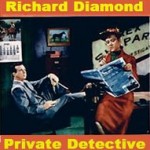Richard Diamond, private detective 1/??? (Richard Diamond, soukromý detektiv, 1949 – 1953)

Blake Edwards. Režie Blake Edwards. Produkce Dick Powell.
Osoby a obsazení: Richard Diamond (Dick Powell), poručík Walt Levinson (Ed Begley), Helen Asherová (Virginia Greggová), policista Otis / Francis, Helenin sluha (Wilms Herbert) a další.
Nastudovalo NBC v letech 1949 – 1953 (1 díl 30 min., vysíláno 1 x týdně). Vydalo Radio Archives v roce 2006 (1 CD).
Pozn.: Detective is a detective drama which was on radio from 1949 to 1953 and on television from 1957 to 1960.
Dick Powell starred in the Richard Diamond, Private Detective radio series as a rather light-hearted detective who often ended the episodes singing to his girlfriend, Helen (Virginia Gregg). It began airing on NBC on April 24, 1949, picked up Rexall as a sponsor on April 5, 1950, and continued until December 6, 1950. The shows were written by Blake Edwards.
With Camel cigarettes as a sponsor, it moved to ABC from January 5, 1951, to June 29, 1951, with Rexall returning for a run from October 5, 1951, until June 27, 1952.
Substituting for Amos ‚n‘ Andy, it aired Sunday evenings on CBS from May 31, 1953 until September 20, 1953.
Because Dick Powell was known for musical comedies prior to his appearance as Philip Marlowe in Raymond Chandler’s Murder, My Sweet (1944) and because he was a detective who sang in Richard Diamond, Private Eye, some regard this radio series as an influence on the character of Philip E. Marlow (Michael Gambon) in Dennis Potter’s Chandleresque The Singing Detective (1986).
Pozn. 2: Richard Diamond, Private Detective proved to be the perfect radio vehicle for actor-singer Dick Powell, combining his tough-guy image, showcased in the 1944 film “Murder, My Sweet” and the 1945-46 radio series “Rogue’s Gallery,” with his tremendous talent for a song, as all those 1930s Warner Brothers/Fox musicals will bear out. The detective series, created by an aspiring screenwriter named Blake Edwards, featured a hard-boiled detective who rarely took himself too seriously; Edwards, the future director of the “Pink Panther” film series, conceived the Diamond character as an ex-cop who had decided to hang out his own shingle in the investigation business.
Richard Diamond bore a not-unintentional resemblance to another wisecracking detective of the airwaves, namely Sam Spade (as in “The Adventures of”). Both shamuses – Powell as Diamond, Howard Duff as Spade – demonstrated a breezy insouciance that added a much-needed touch of levity to the type of detective show that was often in danger of sinking under the weight of its own clichés. (On one memorable broadcast from December 3, 1949, Powell is heard to crack “This is the hokiest case I’ve ever been on — even the dialogue is bad.”) The lighthearted tone of “Richard Diamond” was even evident in the program’s weekly opening, which featured Powell whistling a jaunty “Leave it to Love.” It was not uncommon, after cracking each weekly case, for “the singing detective” to sit down at the piano in the penthouse apartment of Helen Asher, his wealthy, red-headed love interest played by Virginia Gregg and also Frances Robinson, and serenade her with a number from the Hit Parade. In-jokes were rampant on the show; Richard would often make reference to other detectives (notably Sam Spade) and he had a particularly pronounced fondness for actress June Allyson — in real life, Mrs. Dick Powell.
Just as Spade had a love-hate relationship with Lieutenant Dundy, Diamond shared a similar bond with his contact on the force, homicide detective Lieutenant Walt Levinson (played at various times by Ed Begley, Ted de Corsia, Alan Reed and Arthur Q. Bryan). The sarcastic badinage between the detective and his easily agitated cop pal provided many a memorable moment on the series. Diamond reserved his suffer-no-fools disdain for Sergeant Otis Ludlum, a cop who had such a force field of stupidity surrounding him that you just know he had to have a relative at City Hall looking after his job. Otis was played by actor Wilms Herbert, who also doubled on the show as Francis, Helen’s faithful retainer; Francis had an uncanny, mood-killing knack of barging in at the most inopportune times, like when Diamond and Helen were getting ready to turn down the lights and pour the wine…if you know what I mean.
“Richard Diamond, Private Detective” debuted over NBC Radio on April 24, 1949 as a sustaining series, but picked up a sponsor in Rexall Drugs (complete with announcer Bill “Whistler” Forman and your Rexall family druggist) in June 1950. Camel Cigarettes picked up the tab as of January of 1951, just before the show moved to ABC, but by June the show was back with Rexall again, which continued its sponsorship until the program left the airwaves on June 27, 1952. (The series would return briefly during the summer of 1953 for CBS, recycling earlier scripts from the 1950-51 season.)
Like so many of his radio contemporaries, Richard Diamond later tried his luck on television in a series that ran sporadically from 1958 to 1960. Powell served as the show’s producer but, since he was too busy to play the title role, he hired a young actor named David Meyer for the part – and then suggested he change his last name to Janssen. David Janssen was certainly game, but he simply didn’t possess Powell’s charm and joie de vivre — even then, he looked as if he was “The Fugitive,” on the run from Barry Morse. If the TV series is remembered at all today, it’s for the early exposure of actresses Barbara Bain and Mary Tyler Moore, with Moore playing “Sam,” the telephone operator at Diamond’s answering service — a role which featured only her sexy voice and her gorgeous legs. Old Time Radio fans know, though, that their fix of Richard Diamond can only be satisfied by tuning in the one-and-only Dick Powell…and what better way to start than with these twenty fully restored half-hour broadcasts, courtesy of the First Generation Radio Archives.
The Ralph Chase Case
Despised by both of his stepchildren, diminutive Ralph Chase hires Diamond to sort out a problem with the estate of his stepdaughter –but does her boyfriend, gangster Murray Lang, have other ideas? Dick Powell sings “I’ve Got My Love to Keep Me Warm” in a show that features Betty Moran, Jack Edwards, Jay Novello and Tol Avery.
Sunday, May 15, 1949 – 30:00 – NBC, sustaining
Stolen Purse and Counterfeit Ring
Glenda, an elderly ex-bunco artist now selling newspapers, hands Diamond a black purse and asks him to find the owner. The purse doesn’t contain any money, so why are so many people willing to kill for it? Dick Powell sings “Lullaby and Goodnight” (or at least gives it the old college try) in a program that features Jane Morgan, Jack Kruschen, Hy Averback, Betty Lou Gerson, Herb Butterfield and Wally Maher.
Sunday, May 22, 1949 – 30:00 – NBC, sustaining
The Betty Moran Case
Wealthy socialite Betty Moran and blackmailing gangster Mac Grayson are both discovered dead in her apartment, which the police rule a murder/suicide. Moran’s husband disagrees, and hires Diamond to refute the cops’ verdict. Dick Powell sings “Again” in a show that features Herb Butterfield, Jack Petruzzi and Tol Avery.
Sunday, May 29, 1949 – 30:00 – NBC, sustaining
The Rene Benay Protection Case
”Richard of Hollywood” is hired by a famous fashion mogul to protect his latest designs, but Diamond soon winds up investigating the designer’s death instead. Dick Powell sings “Don’t Cry Joe” and the program also features Clarke Gordon, Hy Averback, Jay Novello and Kaye Brinker.
Saturday, October 22, 1949 – 30:00 – NBC, sustaining
The John Blackwell Case
Diamond’s amazing prowess with a yo-yo helps immeasurably in an investigation involving a man who informs the detective – in advance – that he’s going to commit a murder. Dick Powell sings “I Only Have Eyes for You” in a show that features Grace Albertson, Hans Conried, Hy Averback and Sidney Miller.
Saturday, December 17, 1949 – 30:00 – NBC, sustaining
A Christmas Carol
In the first version of a show that would become a regular holiday tradition, Diamond and Company perform the Dickens out of the classic Christmas tale. Dick Powell sings “Mele Kalikimaka.”
Saturday, December 24, 1949 – 30:00 – NBC, sustaining
The Doug Saxon Case
Publisher George Victor is ambitious enough to expose Aaron Ziegler, the head of the city’s numbers rackets, but he needs Diamond’s help. Seems his daughter Cathy – who’s also infatuated with one Doug Saxon – works for Ziegler. Dick Powell sings “Time on My Hands” in a program which features Jeanne Bates, Lawrence Dobkin, Hy Averback, Paul Dubov and Stan Waxman.
Sunday, January 15, 1950 – 30:00 – NBC, sustaining
Timothy the Seal
In a program later recycled by director-writer Blake Edwards for his hit TV series “Peter Gunn” (retitled “Let’s Kill Timothy”), Diamond is asked to play bodyguard – to a seal! Dick Powell sings “Cathy” in a program that features Tony Barrett, Lawrence Dobkin, Fay Baker, Junius Matthews and Billy Bletcher.
Sunday, February 5, 1950 – 30:00 – NBC, sustaining
The Elaine Tanner Case
A search for a missing actress finds Diamond embroiled in murder and a missing item of considerable value. Dick Powell sings “All Because You Kissed Me Tonight” in a show that also stars Paul Dubov, Ted Osborne and Jeanne Bates.
Sunday, February 12, 1950 – 30:00 – NBC, sustaining
The Jewel Thief
A man with $100,000 in jewelry has been murdered, but his widow claims that the jewels he had were found, not stolen. Lieutenant Levinson asks Diamond to “romance” the woman to shake up her story. Dick Powell sings “Dear Hearts and Gentle People” in a program, which also features Charles Seel, Jack Kruschen and Yvonne Peattie.
Sunday, February 19, 1950 – 30:00 – NBC, sustaining
The Cop Killer
Bill Walton, an old friend of Diamond’s from his days on the force, has had three slugs pumped into him. In locating his killer, Diamond finds himself involved with a blind ex-con and a narcotics racket. Dick Powell sings “I’ve Got a Loverly Bunch of Cocoanuts” in a show that also stars Lawrence Dobkin and Charles Seel.
Sunday, February 26, 1950 – 30:00 – NBC, sustaining
The Louis Spence Case
Shades of “Dragnet”: an escaped mental patient is holding Levinson and the Fifth Precinct hostage with a time bomb. His demands seem reasonable; after all, he’s only asking that the Mayor take a dive off the top of City Hall! Dick Powell sings “There’s My Tomorrow” in a show that features Cynthia Corley, Paul Dubov and Stan Waxman.
Sunday, March 5, 1950 – 30:00 – NBC, sustaining
The Joyce Wallace Case
A stage actress who’s been mysteriously shot at is anxious to keep the incident quiet for fear of bad publicity, so she hires Diamond to investigate. She later finds herself attacked again – this time, by a snake! Dick Powell sings “If I Knew You Were Coming, I’d Have Baked a Cake” in a program which also features Charles Seel, Clarke Gordon, Jack Kruschen and Joan Banks.
Sunday, March 12, 1950 – 30:00 – NBC, sustaining
The George Phipps Case
A sidewalk photographer takes a snapshot of Diamond, then hands him a card. Upon further examination, the card turns out to contain a photo negative — a valuable clue in the photographer’s subsequent demise. Dick Powell sings “Back in Your Own Backyard” in a program that features Jack Kruschen, Jeanne Bates, Byron Kane and Tony Barrett.
Sunday, March 26, 1950 – 30:00 – NBC, sustaining
Death and the Package
The series sends-up “The Maltese Falcon,” Sam Spade’s most famous case, in a tale involving a man who presents Diamond with a unique statue wrapped in a newspaper –just before he expires in his office. Dick Powell sings “Bye Bye Baby.”
Wednesday, April 5, 1950 – 30:00 – NBC, sustaining
Pete Rocco Breaks Jail
The mother of a prison escapee who Diamond sent to the jug hires Richard to find her son and return him to the care of the state before he does something silly — like killing “the singing detective.” Dick Powell sings “A Little Bit Independent” in a show that also features Howard McNear.
Wednesday, October 4, 1950 – 30:00 – NBC, sponsored by Rexall
The Nancy Lang Case
A dying man stumbles into Diamond’s office and hands him a sealed envelope after muttering “Key West.” Does this important letter have anything to do with the mysterious woman who’s hired Diamond to play bouncer at a party? Alas, no song from “the singing detective” on this broadcast, which features Barton Yarborough, Barney Phillips and Lou Krugman.
Wednesday, November 8, 1950 – 30:00 – NBC, sponsored by Rexall
The Marilyn Connors Case
A nightclub singer hires Diamond to protect her from her newly paroled husband, who suspects her lover set him up for a prison rap. He’s later found dead, shot with the lover’s gun. Dick Powell sings “Nevertheless” in a program that also features Mary Shipp, William Conrad and Theodore Van Eltz.
Friday, January 12, 1951 – 30:00 – ABC, sponsored by Camel Cigarettes
A Man With a Scar
The chairman of the parole board is being blackmailed. Seems that some individuals have convinced him that his son Rodger is responsible for killing a man and he’s been paying to have it covered up. But are the blackmailers mainly interested in money – or in springing prisoner John Alterung from jail? No song this time, but the supporting cast features Joseph Kearns, Brook Temple, Lucille Meredith, Tony Barrett and Jack Kruschen.
Friday, January 19, 1951 – 30:00 – ABC, sponsored by Camel Cigarettes
The Rollins Case
Five years ago, Martin Rollins was sent to jail after being convicted of embezzlement. Now he’s been released – and it seems that his first act as a free man was to mail a threatening letter to his brother, B. E. Rollins. A reluctant Diamond is hired to find Martin – but before he can do so, B. E. is shot in cold blood. No song from Mr. Powell, but the supporting cast includes Virginia Gregg, Ted Osborne, and Tom Tully.
Friday, January 26, 1951 – 30:00 – ABC, sponsored by Camel Cigarettes
The Hank Burton Case (premiéra 21. 3. 1952 – k poslechu zde).
The Dixon Case (k poslechu zde).
If you enjoyed this post, please consider to leave a comment or subscribe to the feed and get future articles delivered to your feed reader.






Dick Powell was terrific on the Richard Diamond radio show. The closing credits had him break up the announcer and the other actors sometimes. And he whistled the theme song. :)